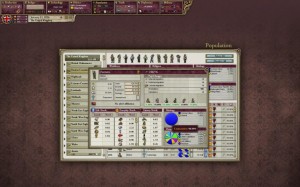Here’s a thing that bugs me about videogames that take place over a long period of time; They run on the assumption that what held true in our world will hold true in that way. Absolute monarchy and aristocracy begin, and these are gradually or violently reduced in favor of either constitutional monarchy or republicanism. Divine Right gives way to consent of the governed. Religion begins as a dominant force for the entire planet, and gradually declines in importance. It’s true that most games allow you through some means or other to maintain your previous status quo, but the assumptions are always the same – later technologies unlock new governments and these are superior to previous ones. You can run a theocratic state in Civ but if your rivals are a police state or democracy, they’re likely to outproduce you by some measure due to the bonuses they get compared to yours.
Now, in the first instance, I understand that even making these value judgments can be a pretty tricky task if you’re making a game which offers a number of governmental forms, and every single thing you add to that can complicate it considerably. Let’s take Communism as a working example. Superficially it’s easy to see why a Communist state would get a bonus to industry – Stalin forced the USSR from peasant serfdom to industrial superpower within a couple of decades, and Mao attempted the same in China (Though it was Deng Xiaoping’s free-market oriented reforms which have unleashed the Middle Kingdom’s current surge in wealth). Hoxha’s Albania and the DPRK regime both put military production before any other consideration. Our real-world historical examples of it are industry-centered, militaristic, and vary from merely autocratic to incomparably vicious.

The question is, does this demonstrate what Communism has to be? Or is this how it is perceived because that’s how it worked out in our world? I would argue no, that much as I am opposed to it as a system, it wasn’t a fait accompli that it would turn out as it did. Had it taken hold in a heavily industrialized country such as the UK, France, Germany, or the USA, had the Mensheviks taken power in 1917, had the CNT-FAI won in Spain and resisted Stalinist control, we might well have a very different image of what Communism is.
My point isn’t to defend Communism. I’m merely using it because it’s an excellent example for what I am talking about, which is that game makers rely overly on preconceptions rooted in our reality’s experience to inform them of how things work in their games. More interesting, I feel, would be a more gradual, evolving system, where you didn’t choose your form of government so much as evolve it over the course of the game by reacting to events and conditions. The closest example to this I am aware of is Victoria II, where different political groups have various objectives, and different ones are allowed to do different things (So the reds can build factories all over the place, whilst radical liberals can’t fund any, for example) but even so, it feels somewhat thin, perhaps because it takes place over a relatively short time period.
I would, in any event, love to see a game on the timescale of Civ or even Spore where the development of not only your country, but its ideologies and most of all, what those ideologies actually entail, changes over the course of the game. For another example, consider that during the Renaissance and Enlightenment it was argued by many (very pious) people that to understand the universe in a scientific manner was not only in accordance with being a good Christian, but indeed a form of worship in itself. The argument (Grossly oversimplified; I’m no theologian) was that as God had created everything, everything was holy, and thus understanding anything had to be an act of worship in itself. What if such a perspective had taken hold even more strongly and become as universal an attitude towards Christianity as the doctrine that Christ died on the Cross? I doubt the current perspective that religion is dogmatic and myopic whilst secularism is the route to a more accurate understanding of the world would be as deeply entrenched by any means.

The problem is, of course, that this is an immensely complicated field. Even working on the experiences of our actual history, we have a huge amount of different experiences to draw on. When you implement “Democracy” in Civilization, is it the democracy of Athens? Is it a democracy where only the landed elite can vote? Is it constrained by constitutional checks and balances? How do you model a unicameral vs. a bicameral system? Is the President the Head of State only (As in the Irish Republic) or the Head of State and Head of Government, as in the USA? And what influence does this have on how the respective countries are run? These are all just individual factors of a single potential form of government. How they all interact, how they might all evolve over the course of centuries, is certainly a daunting thing to tackle in even the densest academic text, nevermind a videogame.
But ultimately, isn’t that what more ponderous strategy games are about? You’re not just drawing your lines on the map, you’re creating a country, wrestling with competing concerns, trying to do five things with the resources to do three of them properly, listening to the concerns of different groups in your society and deciding how to react? I admit it might be something of a niche game, but I think there would be room for something that really went into the evolution of political systems, religions, and social ideas in videogames.



